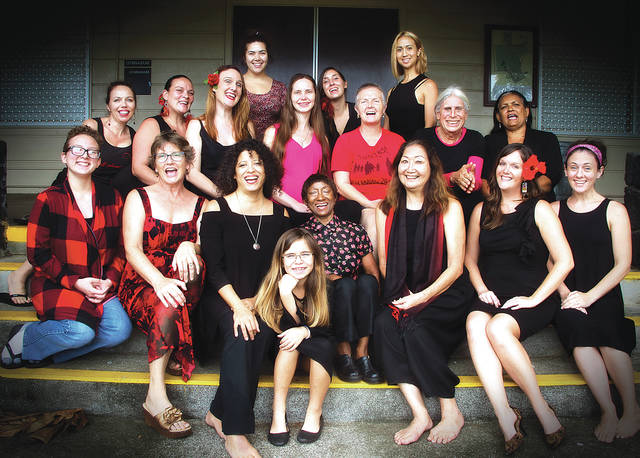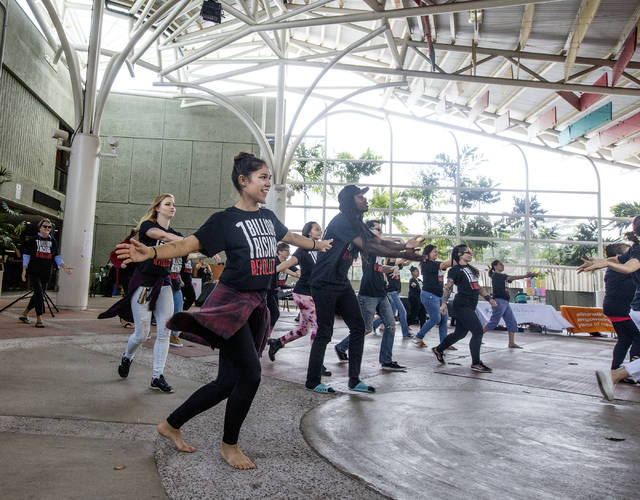A woman wore a radiant smile and danced during a flash mob Wednesday at the University of Hawaii at Hilo plaza — but tears formed afterward.
She was there, with more than 30 women of diverse ages and a few supportive men, to call for an end to violence against women through dance — part of the 20th anniversary of the play “The Vagina Monologues.”
“After being raped and abused in my life, it’s beautiful to be able to go to a place where I can go out there and dance,” the woman said, shaking with emotion but strong in voice, not ready — yet — to share her name publicly.
Karishma Kamath, UH-Hilo student conduct director and interim director of the university Women’s Center, is directing this year’s “Vagina Monologues” production Saturday on campus.
She said the 90-minute show explores “many, many things that women go through in their lives.”
Topics include domestic violence, hair, experience with men, rape, childhood sexual abuse, being angry and the “psycho-products” women must use.
The lunchtime celebratory event at UH-Hilo offered glimpses of “The Vagina Monologues” and “Emotional Creatures,” a teen version of “Monologues” that will be presented as a senior project by Waiakea High School students Brittney Williams and Bailie Mahuna.
Speakers who offered previews of upcoming weekend presentations at UH-Hilo triggered many happy greetings among participants, accepted hugs, supportive hands on a shoulder and congratulations for great work.
But the underpinnings of the gathering were extraordinarily serious.
Participants are part of an international drive against rape, assault, innuendo, inappropriate behavior and verbal abuse — and an activist movement called 1 Billion Rising Revolution.
The 1 Billion Rising Revolution focuses on support for the estimated 1 billion female survivors globally of rape and sexual violence.
“I was thinking about ending violence against women and girls all over the world,” said Kalyan Meola, after she danced in the flash mob.
“The Vagina Monologues,” said former show producer Juanita Revell of Pahoa, “actually helped me to go from being a victim to being a survivor of domestic violence.”
Kamath said “Monologues” supports women in all forms, regardless of gender assignment.
“We’re here to support and build women and we need a whole community to do that,” she said.
“Monologues” does not even address topics such as college sexual assault, drugs and alcohol, abortion or miscarriage, Kamath said.
Even so, the play is packed with wide-ranging topics essential to women, and to those who love them.
“The message is to open a conversation and start the dialogue,” Kamath said. “You watch a monologue and you go home and you process it with your loved ones.”
But more than talk, she said, “we need to act.”
By that, Kamath says she means get involved, to volunteer at a shelter. Volunteer for a crisis line. Start talking to children at very young ages about sexual-abuse prevention. Talk to keiki about who their trusted adults are.
And be clear that they should tell a trusted adult if they become fearful of someone or if inappropriate sexual behavior is directed toward them by anyone, Kamath said.
Ninety percent of violence against women is perpetrated by men, she said. But only 1 in 28 men behave violently.
That means, Kamath said, that the other 27 of those 28 men need to become advocates, speak up and decry violence against women.
“We decided we would put on a monologue that would help bring awareness to the problems that teenage girls face every day,” said Williams, who read at the microphone Wednesday in the UH-Hilo Plaza as part of her senior Health Academy project.
Many times, those issues aren’t commonly known among parents, she said.
For example, Mahuna, her project colleague, said suicidal thoughts such as “I’m not worthy enough” are more common among teen girls than many people realize.
“Just being around people that enjoy life, or love you for who you are,” is essential for such individuals, Mahuna said.
Williams said she wishes teen girls wouldn’t need to experience sexual harassment or body image worries, which also are common concerns for teen girls to face.
During the project, Williams grew confident about her internal and external beauty and recognizes that her self-esteem matters.
“I think the greatest thing I’ve learned is self-worth,” she said.
Email Jeff Hansel at jhansel@hawaiitribune-herald.com.
Female voices
“The Vagina Monologues” took the world by storm after originator Eve Ensler premiered them in New York 20 years ago. “Monologues” and its teen version, “Emotional Creatures,” will be presented this weekend at the University of Hawaii at Hilo in observance of the play’s 20th anniversary:
• “The Vagina Monologues,” 6:30 p.m. Saturday, UH-Hilo old gym on Kapiolani Street, with presenters ages 7-69. Suggested donations $10-$20, $5 for students.
• “Emotional Creatures,” 2 p.m. Sunday, UH-Hilo old gym on Kapiolani Street, a senior project by Waiakea High School students Brittney Williams and Bailie Mahuna. Free.




